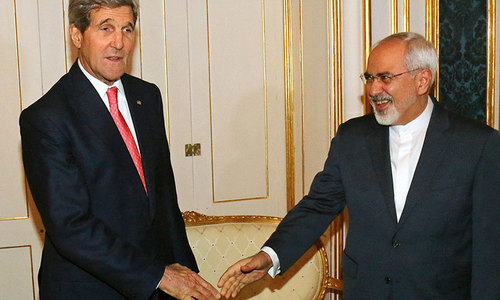TEHRAN: Iran said on Sunday there would be "no final implementation" of a nuclear deal with world powers unless a probe into allegations of past weapons research is closed.
The declaration, by a top security official, comes after the head of the UN nuclear watchdog IAEA said a report into the possible military dimensions of Iran's activities would not be “black and white”.
Iran has always denied seeking to develop an atomic weapons capability, insisting its nuclear programme is for peaceful energy production and medical purposes only.
Referring to the Joint Comprehensive Plan of Action, the July 14 agreement's official name, Admiral Ali Shamkhani, said anything short of the watchdog's probe being closed was “unacceptable to Iran”.
“Without the closure of the file regarding past issues, there is no possibility of implementing the JCPOA,” the official IRNA news agency reported him as saying.
Shamkhani is secretary of Iran's Supreme National Security Council (SNSC), the country's highest security body, which was tasked with supervising the nuclear deal.
The committee reports to supreme leader Ayatollah Ali Khamenei, who has the final word on all policy decisions.
Under the July 14 accord, Iran agreed to major curbs on its atomic programme, particularly its enrichment of uranium to high purities, in return for the lifting of all nuclear-related sanctions imposed by the United States, the European Union and the United Nations.
Read: Iran, major powers reach historic nuclear deal in Vienna, diplomats confirm
Shamkhani said the six countries which struck the deal with Iran (Britain, China, France, Russia, the United States and Germany) must drop the possible military dimensions issue.
“The P5+1 must choose between the JCPOA and leaving open the so-called past military dimensions (PMD) file,” he said.
The probe concerns allegations, rejected by Iran, that at least until 2003 it conducted research into how to make a nuclear weapon.
The head of the International Atomic Energy Agency, Yukiya Amano, said on Thursday that the watchdog now has a “better understanding” of Iran's past activities, but his report, due no later than December 15, will not be a “black and white assessment”.
“This is not an issue which can be answered 'yes' or 'no',” he said.
Shamkhani's comments were similar to those of Iran's Deputy Foreign Minister Abbas Araghchi, who said Wednesday that the nuclear deal would not be implemented if the PMD file is left open.
Resolving the IAEA's investigation into what Iran may have done in the past is essential for regaining trust between Tehran and the international community, the six world powers say.
Related: World powers to help Iran redesign reactor as part of N-deal
The final PMD report may reach the IAEA's board of governors as early as Tuesday or Wednesday, diplomats say.
It would allow “implementation day” for the nuclear deal, when sanctions begin to be lifted, as long as its conclusions are deemed as having closed the allegations.













































